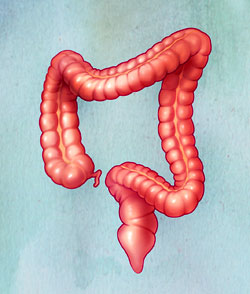 Irritable Bowel Syndrome (IBS) – also known as spastic colon, spastic colitis, mucous colitis and nervous or functional bowel – occurs when the colon does not contract normally (that is, with smooth, rhythmic contractions). Instead, it seems to contract in a disorganized and sometimes violent manner. The contractions may last for prolonged periods of time.
Irritable Bowel Syndrome (IBS) – also known as spastic colon, spastic colitis, mucous colitis and nervous or functional bowel – occurs when the colon does not contract normally (that is, with smooth, rhythmic contractions). Instead, it seems to contract in a disorganized and sometimes violent manner. The contractions may last for prolonged periods of time.
You may also experience abdominal discomfort, excessive gas, cramping or pain that moves around the abdomen rather than remaining localized in one area. It can be characterized by both diarrhea and or constipation.
FAQs
Factors include:
- Stress – one of the most common factors associated with symptoms
- Food Intolerances – such as coffee, alcohol, spices, raw fruits, vegetables and milk
- History of a previous GI tract infection
- History of previous sexual or physical abuse
Patients with IBS often have a lower pain tolerance and exacerbations can be associated with menstrual periods and even the weather.
There are three main types of IBS:
- IBS with constipation (IBS-C)
- IBS with Diarrhea (IBS-D)
- IBS with mixed bowel habits (IBS-M) – alternating hard and loose watery bowel movements
There are a number of approaches that can help:
- Diet – Eating a diet high in roughage and bran can be helpful. You can also take over-the-counter bulking agents such as psyllium mucilloid (Metamucil®, Konsyl®) or methylcellulose (Citrucel®). You may also benefit from eating smaller, more frequent meals to block the “spastic” reflex. A low-FODMAP diet can be helpful- FODMAPs to be avoided include wheat, apples, pears, onion, garlic, honey, agave syrup, sugar free gum, mints and some medicines.
- Medicines – Antispasmodic medications can help relax the muscles in the wall of the colon, reducing the bowel pressure. Mild sedatives can also help reduce stress and anxiety. Sometimes antibiotics can be used to regulate the intestinal biome.
- Exercise – This is very beneficial in helping the bowel relax even during non-exercise periods.
- Stress – Reduction techniques, like breathing exercises, can be helpful in reducing symptoms. Sometimes medications will play a role as well to reduce stress, anxiety and depression.
IBS does not put you at risk for Crohns disease or colitis. It does not increase your risk for colon cancer.
Although not life threatening, it can affect your day to day living. Involving your physician in diagnosis and treatment is the best way to ensure that your treatment plan has the best chance for success.